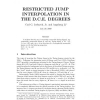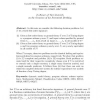116
click to vote
JC
2000
15 years 1 months ago
2000
The Turing degree of a real number x is defined as the Turing degree of its binary expansion. This definition is quite natural and robust. In this paper we discuss some basic degr...
APAL
2005
15 years 1 months ago
2005
We investigate operators which take a set X to a set relatively computably enumerable in and above X by studying which such sets X can be so mapped into the Turing degree of K. We...
100
click to vote
MSCS
2006
15 years 2 months ago
2006
It is shown that for any 2-computably enumerable Turing degree l, any computably enumerable degree a, and any Turing degree s, if l = 0 , l < a, s 0 , and s is c.e. in a, then...
APAL
2010
15 years 2 months ago
2010
We investigate computability theoretic and topological properties of spaces of orders on computable orderable groups. A left order on a group G is a linear order of the domain of ...
112
click to vote
BIRTHDAY
2010
Springer
15 years 3 months ago
2010
Springer
In this note we consider the following decision problems. Let be a fixed first-order signature. (i) Given a first-order theory or ground theory T over of Turing degree , a program...
108
click to vote
CIE
2005
Springer
15 years 7 months ago
2005
Springer
Let us say that a c.e. operator E is degree invariant on any given Turing degree a if X, Y ∈ a → E(X) ≡T E(Y ). In [4] we construct a c.e. operator E such that ∀X[X <T E...
133
click to vote
CIE
2009
Springer
15 years 8 months ago
2009
Springer
This paper studies the Turing degrees of various properties defined for universal numberings, that is, for numberings which list all partial-recursive functions. In particular pro...


